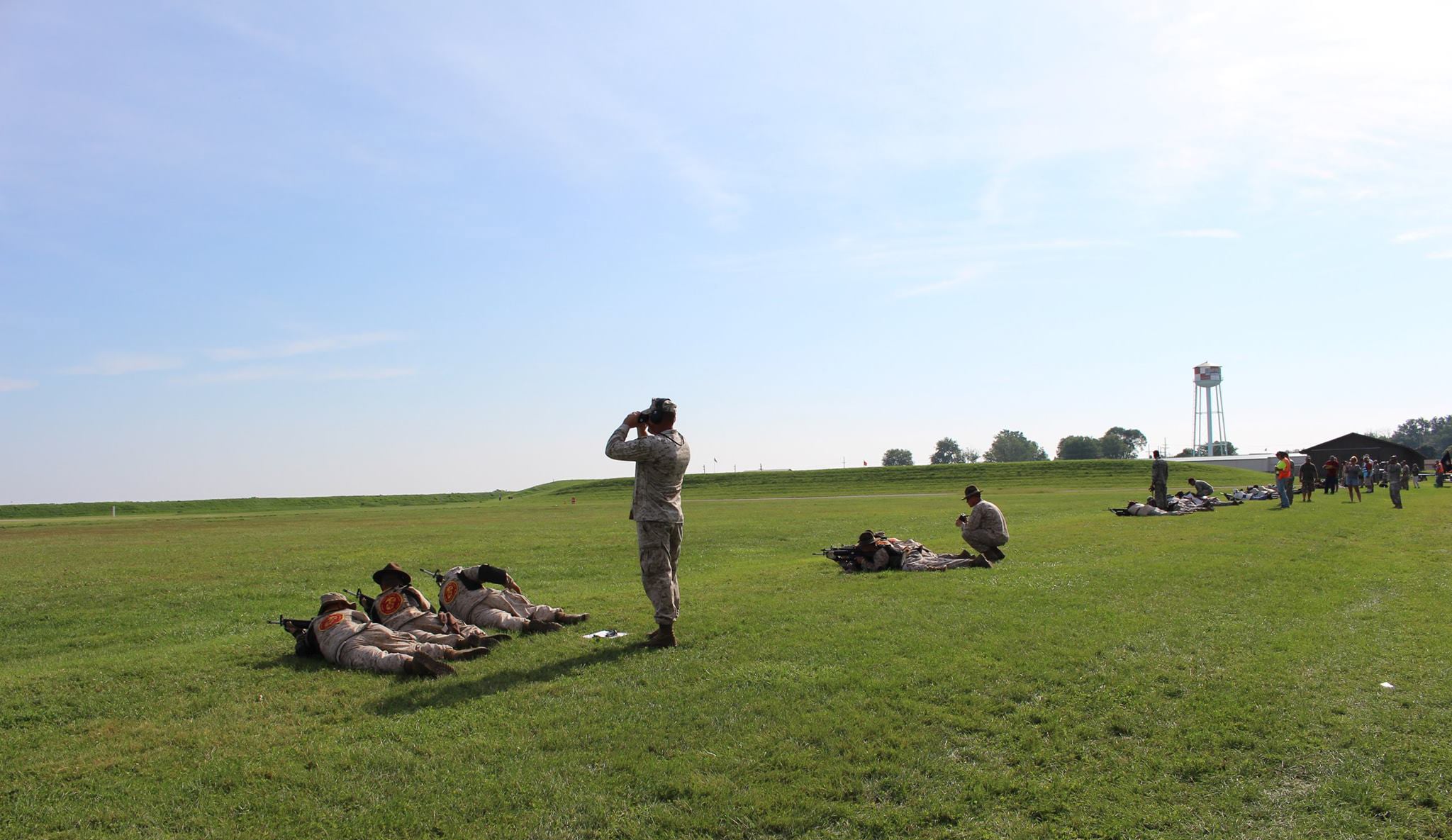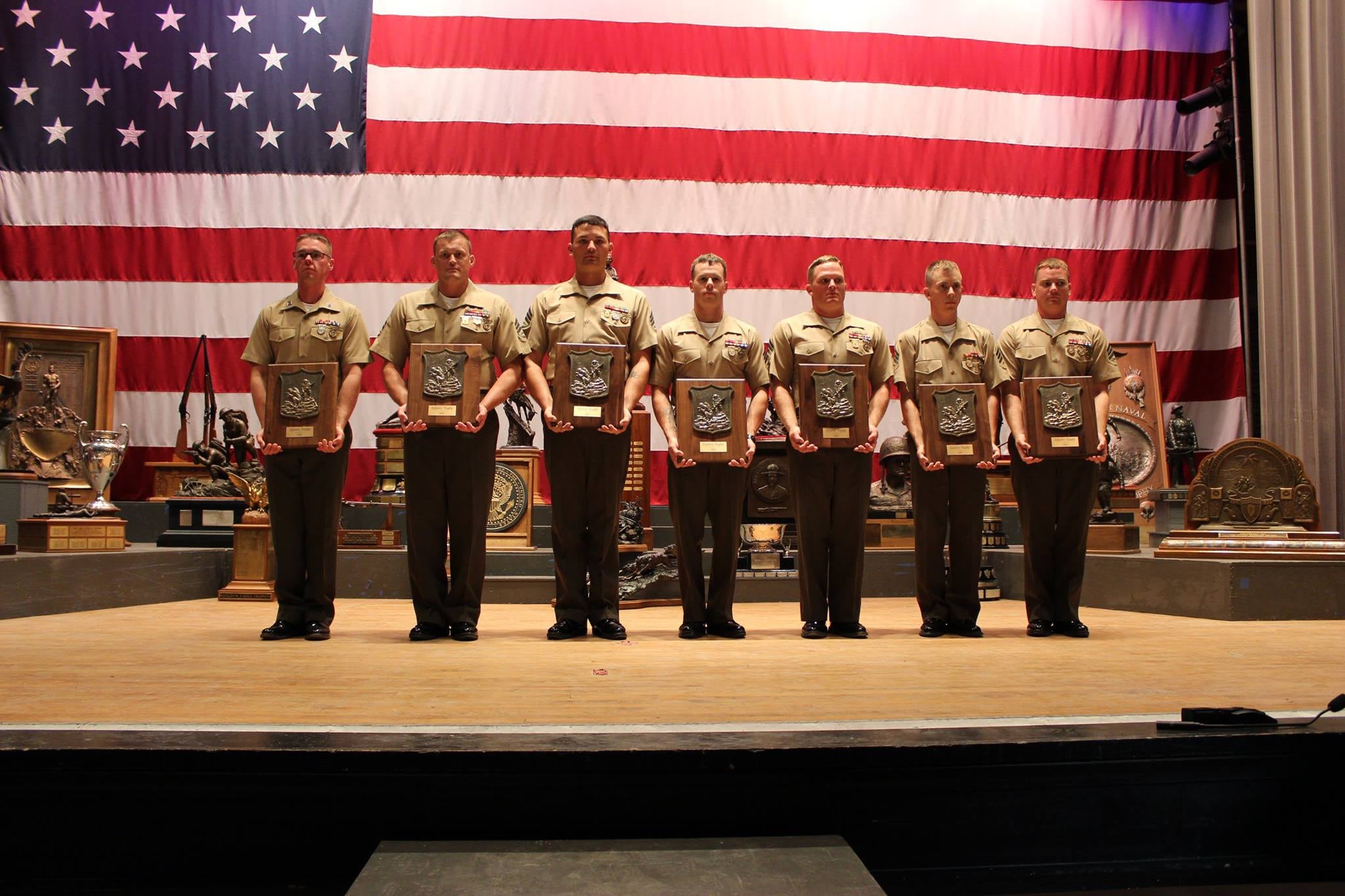MARINE CORPS BASE QUANTICO, Va. — The Quantico-based Marine Corps Rifle Team recently crushed the competition — including the Army — when it clinched the national title smashed 31 other teams, including the Army’s, at the 2015 National Infantry Trophy Team Match, taking first place at the competition for the first time in a decade.
The Marines scored It is a monumental victory when they edged out 31 other teams made even more impressive by treacherous wind conditions at to win the 2015 National Infantry Trophy Team Match held last month July 19 match at Camp Perry, Ohio.
The win was made even more impressive by the when they team faced tough treacherous wind conditions the team faced, with when gusts reaching up to reached 10 to 15 mph, said Staff Sgt. Mark Altendorf, the team’s coach said. When firing from At 600 yards away, the gusts were impacting a shots dramatically. that can push a bullet several feet off target and was the downfall of many competitors.
"The teams ahead of us were getting blown completely off target," Altendorf said. "One shooter was putting 40 rounds down on a target and having zero impacts." " said Staff Sgt. Mark Altendorf, the team’s coach. "We were watching results ahead of us and getting some anxiety."
It was nerve-racking agreed Capt. John Sheehan, the team captain, said seeing the shooters ahead of them struggle was nerve racking.
"All that hard work on the range for hours, culminating in weeks ... , culminating in months, all hangs at this one moment," he said.
The Marine Corps Rifle Team members:
- Capt. John Sheehan, team captain
- Staff Sgt. Mark Altendorf, coach
- Sgt. Tanner Bauer, shooter
- Sgt. Jeremy Benjamin, shooter
- Sgt. Antonio DiConza, shooter
- Sgt. Joseph Dukich, shooter
- Sgt. Joseph Peterson, shooter
- Staff Sgt. Chad Ranton, shooter
When the team hit the firing line, however, everything fell perfectly into place, he said. After they competed shooting, the Marines team’s members knew they had beaten the Army Rifle Team. They watched tensely for hours as other teams competed, but it was several more hours of tense waiting as other teams continued to compete to see if they would take home the trophy.
The Marine Corps' six shooters and two coaches ultimately earned a total of 1,270 points. The compared to the Texas State Rifle Association’s team took second with which earned 1,191 points, for second place and the Army’s team finished third with a score of 1,155 points, putting them in third.
The course of fire used during the competition was developed in 1922, and simulates advancing towards the enemy in during World War I-style trench warfare, said Maj. Eric Antonelli, the team’s officer in charge. While warfare has changed dramatically, the competition remains an arduous measure of fundamental combat marksmanship.
Teams must out-shoot others during four timed strings of fire from the 600-, 500-, 300- and finally 200-yard lines. While longer shots count for more points, they are more likely to result in costly misses. But the Marines eschewed the shorter distances in favor of putting as many rounds down range as possible during the 600- and 500-yard stages, where they earned all their points. They also earned bonuses for each target that had six or more hits.
At the start, teams are issued exactly 384 rounds for the entire competition to distribute among their members however they choose would like. During each string, a team’s six shooters have 50 seconds to put as many rounds on target as they can, meanwhile coaches use binoculars to spot shots and instruct them to adjust their aim to compensate for any winds. support by making wind calls and directing constant adjustments using 10x binoculars to spot shots.

Coaches' wind calls and spotting were critical to defeating more than 30 other teams, including the Army.
Photo Credit: Courtesy of Chrystal Rene Altendorf
There is a catch. While longer shots count for more points, they are more likely to result in costly misses. But, the Marine team put as many rounds down range as possible during the 600- and 500-yard stages, where they earned all their points with bonuses for each target that had six or more hits.
If that sounds complicated, it is. As a result, the match requires sound tactics as much as sound marksmanship and a team that can communicate on the fly.
"It takes a team to win, and just one person to lose it," said Sgt. Joseph Peterson, one of the team’s shooters. "They call it a coach’s match because it is on them to have to make the wind call. " Peterson added. "It is just our job to shoot straight."
For example, if one shooter has a malfunction, others must instantly pick up their target. And if a 10 mph gust dies down in the middle of a string of fire, coaches who are spotting must walk shooters back on target as quickly as possible.

Members of the rifle team receive their National Infantry Trophy Team Match awards on July 22. From left to right is Capt. John Sheehan, Staff Sgts. Mark Altendorf and Chad Ranton, Sgts. Tanner Bauer, Antonio DiConza, Joseph Dukich, and Jeremy Benjamin. Not pictured is Sgt. Joseph Peterson.
Photo Credit: Courtesy of Chrystal Rene Altendorf
The rifle team is one of the Marine Corps' three marksmanship teams. The service also has a National Infantry Team Match is just one of many exciting competitions attended by the Corps' three shooting teams that also include a pistol team and a combat marksmanship teams that shoots multi-gun competitions where competitors transition between pistol, rifle and shotgun to engage targets at various ranges, while on the move. The teams participate in several national-level competitions each year.
The shooting teams are always looking for more applicants, But, the teams are in desperate need of more applicants, Antonelli said. The officer in charge He has only about a third 30-40 percent of the 32 Marines he is permitted to have on the rifle team by his authorized table of organization.
He encourages Marines to learn more about applying for one of the team's three-year assignments As a result, he encourages as many Marines as possible to apply for a three-year assignment to a team by contacting him at eric.antonelli@usmc.mil or his staff noncommissioned officer in charge Master Sgt. Jorge Carrillo, his staff noncommissioned officer in charge, at jorge.carrillo@usmc.mil.
Marines can also call team leaders directly at (703) 784-5450 or (703) 784-5539.
Antonelli said applicants They do not have to be competitive shooters — they just need have the right attitude and a be willingness and want to learn, Antonelli said.




